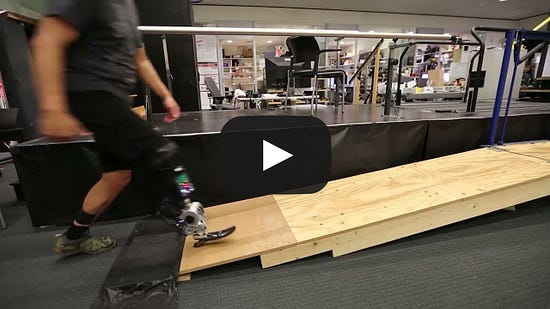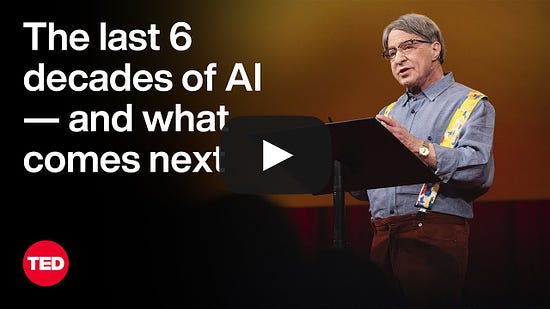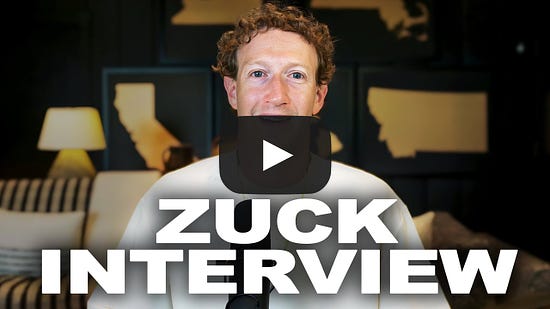Big Tech's new plan to acquire AI startups - Weekly News Roundup - Issue #474
I hope you enjoy this free post. If you do, please like ❤️ or share it, for example by forwarding this email to a friend or colleague. Writing this post took around eight hours to write. Liking or sharing it takes less than eight seconds and makes a huge difference. Thank you! Big Tech's new plan to acquire AI startups - Weekly News Roundup - Issue #474Plus: the best bionic leg yet; Apple to get a set on OpenAI's board; Perplexity, Suno and Udio are in trouble; new humanoid robots; Biotech Behemoths in review; and more!Hello and welcome to Weekly News Roundup Issue #474! We have a packed issue this week, with the main story focusing on the new way Big Tech companies are absorbing smaller companies. We saw this new playbook unfold twice recently with Inflection and Adept, and we can expect it to happen again. In other news, Apple is reportedly getting a seat on OpenAI’s board. Meanwhile, Perplexity, Suno, and Udio have found themselves in hot water over copyright infringement. Over in robotics, Figure shares an update on how their humanoid robot is performing in BMW’s factory, and two new humanoid robots join the scene. Additionally, Neuralink has postponed its second clinical trial, and researchers from MIT have built the best bionic leg yet. Enjoy! Big Tech's new plan to acquire AI startupsTech revolutions (or bubbles, depending on your views) tend to play out roughly in the same way every time. First, there is a promising idea or technology. A small group of people develop the idea and show its potential. The first startups working on that idea are formed, and the initial rounds of investments are made. As the new big thing gains attention, more people want to join the party. New startups emerge, and more money is poured into these companies in the hope that some will go big. Seemingly in the blink of an eye, a rather large scene has formed. However, the party cannot last forever. At some point, the winners start to emerge. Maybe they were the first to the party. Maybe they have a better product or a stronger team. Or perhaps they simply have more money and resources than others. In any case, they have something others don’t. The winners begin to capture a larger share of the market and attract more investments. Companies that can’t keep up either close down or get acquired by bigger players. We saw a similar pattern previously unfolding with the internet companies of the early 2000s and with smartphone and social media companies in the 2010s. We now see the same pattern emerge with all those companies that jumped on the large language model train. However, there is a twist to that pattern that can shape how not only AI but the whole tech industry will operate in the future. We are entering the market consolidation phaseOpenAI. Anthropic. Inflection. Adept. Mistral. AI21 Labs. Cohere. G42. Aleph Alpha. And many more in China and elsewhere in the world joined the large language model party. Billions have been invested in those companies in recent years to build essentially the same thing—a large language model that can be used in a chatbot like ChatGPT or power third-party apps through APIs. Over the past 2-3 years, AI companies were in the middle phase. New startups emerged with investment rounds measured sometimes in hundreds of millions and even billions of dollars. Mistral AI, a French AI startup founded by former DeepMind and Meta employees, was founded in 2023 and raised a $113 million seed round for a $260 million valuation while not having any product yet. A year later, Mistral raised an additional €600 million (about $650 million) and reached a valuation of €6 billion ($6.5 billion). Meanwhile, Amazon invested $4 billion into Anthropic and Microsoft put over $10 billion into OpenAI. According to the Stanford AI Index 2024, generative AI startups attracted $25.2 billion in investments last year alone, almost eight times more than in 2022. However, we now start to see the signs that we are entering the next phase—after the initial explosion comes the phase of acquisitions and consolidation. The first indication of how eager tech giants are to acquire AI startups came during the OpenAI drama, when Microsoft quickly stepped in and tried to hire Sam Altman and those loyal to him. In the end, OpenAI survived and was not absorbed by Microsoft. Others, however, have not shared the same fate. The first victims of Big Tech’s new playbookInflection AI became the first victim of the consolidation phase. Founded by DeepMind co-founder Mustafa Suleyman, Reid Hoffman, one of the founders of LinkedIn, and Karén Simonyan, a former DeepMind employee, Inflection raised $1.5 billion in total and was valued at $4 billion last year. The company was also building, together with CodeWeave and Nvidia, what was in June 2023 the largest AI cluster in the world to serve its large language model, Inflection-2. The company offered Pi, a personal AI chatbot, and was planning to open access to Inflection-2 through an API for developers to use their large language model. So it came as a bit of a surprise when news broke out in March 2024 about Microsoft quasi “acqui-hiring” Inflection. Microsoft paid $650 million to license Inflection’s technology and to hire most of the startup’s 70 employees. Among those hired by Microsoft were Mustafa Suleyman and Karén Simonyan, with the former being appointed as the CEO of the newly founded Microsoft AI, Microsoft’s internal AI lab. What is interesting about that deal is that it had the “hiring” part but not the “acqui” part of “acqui-hiring.” Normally, when a company is acqui-hired, its employees are moved to the acquirer, and the acquired company ceases to exist as an independent entity. In this case, Microsoft did hire most of Inflection’s employees but did not absorb the company. Inflection still exists as an independent company, albeit now resembling a skeleton of what it once was. A similar fate recently befell another AI startup, Adept. Adept, which raised $415 million in capital and reached a valuation of around $1 billion, is developing an in-house foundation model to power AI agents that can automate software workflows. In May, reports began to emerge that the company was struggling and looking for a buyer. According to The Information, Adept was in talks with Meta and Microsoft regarding a possible acquisition. In the end, it was not Meta or Microsoft that absorbed the struggling startup—it was Amazon. On June 28th, 2024, Adept announced that its co-founders and some of its team would be joining Amazon. Additionally, Amazon will license Adept’s foundation models, agent technology, and a few datasets. Similarly to what happened with Inflection, whatever is left of Adept still exists as an independent company. Big Tech’s new and subtle way of absorbing startupsWhat we have witnessed with Inflection and Adept is a new way for Big Tech to absorb smaller companies, which doesn’t yet have a catchy name. These deals were designed to acquire the talent and technology without acquiring the company itself. The “target” company still exists after the deal is done but only as a shadow of its former self. One reason for Big Tech to make acquisitions in this way could be to avoid scrutiny from regulators who would take a closer look at these deals if they were traditional acquisitions. This scrutiny could cause delays, extra costs, and even the collapse of the deal. For instance, Amazon’s $1.4 billion deal to acquire iRobot, the creators of Roomba, failed due to the EU blocking the deal. Similarly, Nvidia’s $40 billion plan to acquire ARM failed due to “significant regulatory challenges.” Microsoft, meanwhile, spent 20 months battling with regulators in the US, the UK, and the EU to successfully close the $68.4 billion acquisition of Activision Blizzard. I don’t think Inflection and Adept will be the only victims of the consolidation phase. I expect this new playbook to unfold again not only in the AI space but possibly in the wider tech space as well. The question now is, who, after Inflection and Adept, will be next? If you enjoy this post, please click the ❤️ button or share it. Do you like my work? Consider becoming a paying subscriber to support it For those who prefer to make a one-off donation, you can 'buy me a coffee' via Ko-fi. Every coffee bought is a generous support towards the work put into this newsletter. Your support, in any form, is deeply appreciated and goes a long way in keeping this newsletter alive and thriving. 🦾 More than a humanNeuralink Surgery Postponed for Brain-Implant Startup’s Second Patient  Researchers from MIT have created a new type of prosthetic leg that is controlled through neural signals, allowing patients to walk with a natural gait. The approach involves surgery at the amputation site to create what the researchers call an agonist-antagonist myoneural interface (AMI). This creates a two-way connection between body and machine, enabling the prosthetic to move and feel more like a natural leg. Anti-aging molecule successfully restores multiple markers of youth ▶️ The Last 6 Decades of AI — and What Comes Next | Ray Kurzweil (13:11)  In this TED Talk, Ray Kurzweil reflects on the last 60 years of AI and discusses how AGI can usher in a new age for humanity. He envisions a future where we live longer, healthier lives, solve the major challenges we face today, and become better and smarter beings. And according to Kurzweil, that vision of the future will come much sooner than everyone expects. 🧠 Artificial IntelligenceApple Poised to Get OpenAI Board Observer Role as Part of AI Pact Chinese AI firms woo OpenAI users as US company plans API restrictions Major record labels sue AI music companies Buzzy AI Search Engine Perplexity Is Directly Ripping Off Content From News Outlets Ever put content on the web? Microsoft says that it's okay for them to steal it because it's 'freeware.’ Goldman Sachs says the return on investment for AI might be disappointing Zuckerberg disses closed-source AI competitors as trying to ‘create God’  Mark Zuckerberg recently gave an interview in which he outlined Meta’s AI strategy and how Meta’s AI products could assist creators with tasks like using AI agents to represent the creator or small businesses. Zuckerberg shared his vision for an “AI-powered future” for artists and creators, as well as the future of Meta, which includes smart glasses and neural wristbands to replace smartphones. He also addressed his closed-source competitors, stating that AI should not be a technology hoarded and controlled by one company. “It’s almost as if they kind of think they’re creating God or something and … it’s just — that’s not what we’re doing,” he said. “I don’t think that’s how this plays out.” Additionally, Zuckerberg revealed that Meta is working on Llama 4 which looks like will be multimodal and be better at reasoning. If you're enjoying the insights and perspectives shared in the Humanity Redefined newsletter, why not spread the word? 🤖 Robotics▶️ Figure Status Update - BMW Full Use Case (1:38)  In January this year, Figure announced a partnership with BMW, in which the German car manufacturer will test Figure’s humanoid robot in one of its factories in South Carolina. In this video, Figure provides an update on that partnership, demonstrating how effective their robot is at manipulating objects—sometimes two at a time—and placing them precisely where they need to be. Persona AI Brings Calm Experience to the Hectic Humanoid Industry Japan introduces enormous humanoid robot to maintain train lines Robotic hand with tactile fingertips achieves new dexterity feat Why Not Give Robots Foot-Eyes? 🧬 BiotechnologyBiotech Behemoths in Review Thanks for reading. If you enjoyed this post, please click the ❤️ button or share it. Humanity Redefined sheds light on the bleeding edge of technology and how advancements in AI, robotics, and biotech can usher in abundance, expand humanity's horizons, and redefine what it means to be human. A big thank you to my paid subscribers, to my Patrons: whmr, Florian, dux, Eric, Preppikoma and Andrew, and to everyone who supports my work on Ko-Fi. Thank you for the support! My DMs are open to all subscribers. Feel free to drop me a message, share feedback, or just say "hi!" |
Older messages
Superintelligence—10 years later
Wednesday, July 3, 2024
10 years on, some things have changed and some did not ͏ ͏ ͏ ͏ ͏ ͏ ͏ ͏ ͏ ͏ ͏ ͏ ͏ ͏ ͏ ͏ ͏ ͏ ͏ ͏ ͏ ͏ ͏ ͏ ͏ ͏ ͏ ͏ ͏ ͏ ͏ ͏ ͏ ͏ ͏ ͏ ͏ ͏ ͏ ͏ ͏ ͏ ͏ ͏ ͏ ͏ ͏ ͏ ͏ ͏ ͏ ͏ ͏ ͏ ͏ ͏ ͏ ͏ ͏ ͏ ͏ ͏ ͏ ͏ ͏ ͏ ͏ ͏ ͏ ͏ ͏ ͏ ͏
DJI faces ban in the US - Weekly News Roundup - Issue #473
Friday, June 28, 2024
Plus: Apple delays the launch of AI tools in the EU; the first ad made with Sora; a new protein-generating AI; a humanoid robot gets its first proper job; Pope calls to ban autonomous weapons ͏ ͏ ͏ ͏ ͏
Anthropic raises the industry bar for intelligence - Weekly News Roundup - Issue #472
Friday, June 21, 2024
Plus: Ilya Sutskever is back; Nvidia becomes the world's most valuable company; another company trials a humanoid robot; a military robot-dog arms race; a mad scientist grows neurons to play Doom ͏
What is "humanity" anyway?
Thursday, June 20, 2024
And how far can we extend the definition of "humanity"? ͏ ͏ ͏ ͏ ͏ ͏ ͏ ͏ ͏ ͏ ͏ ͏ ͏ ͏ ͏ ͏ ͏ ͏ ͏ ͏ ͏ ͏ ͏ ͏ ͏ ͏ ͏ ͏ ͏ ͏ ͏ ͏ ͏ ͏ ͏ ͏ ͏ ͏ ͏ ͏ ͏ ͏ ͏ ͏ ͏ ͏ ͏ ͏ ͏ ͏ ͏ ͏ ͏ ͏ ͏ ͏ ͏ ͏ ͏ ͏ ͏ ͏ ͏ ͏ ͏ ͏ ͏ ͏
Apple Intelligence is different
Sunday, June 16, 2024
An in-depth look into Apple Intelligence and what Apple is promising with "AI for the rest of us" ͏ ͏ ͏ ͏ ͏ ͏ ͏ ͏ ͏ ͏ ͏ ͏ ͏ ͏ ͏ ͏ ͏ ͏ ͏ ͏ ͏ ͏ ͏ ͏ ͏ ͏ ͏ ͏ ͏ ͏ ͏ ͏ ͏ ͏ ͏ ͏ ͏ ͏ ͏ ͏ ͏ ͏ ͏ ͏ ͏ ͏ ͏
You Might Also Like
Master the New Elasticsearch Engineer v8.x Enhancements!
Tuesday, March 4, 2025
Need Help? Join the Discussion Now! ㅤㅤㅤㅤㅤㅤㅤㅤㅤㅤㅤㅤㅤㅤㅤㅤㅤㅤㅤㅤㅤㅤㅤㅤㅤㅤ ㅤㅤㅤㅤㅤㅤㅤㅤㅤㅤㅤㅤㅤㅤㅤㅤㅤㅤㅤㅤㅤㅤㅤㅤㅤㅤ ㅤㅤㅤㅤㅤㅤㅤㅤㅤㅤㅤㅤㅤㅤㅤㅤㅤㅤㅤㅤㅤㅤㅤㅤㅤㅤ elastic | Search. Observe. Protect Master Search and Analytics feb 24 header See
Daily Coding Problem: Problem #1707 [Medium]
Monday, March 3, 2025
Daily Coding Problem Good morning! Here's your coding interview problem for today. This problem was asked by Facebook. In chess, the Elo rating system is used to calculate player strengths based on
Simplification Takes Courage & Perplexity introduces Comet
Monday, March 3, 2025
Elicit raises $22M Series A, Perplexity is working on an AI-powered browser, developing taste, and more in this week's issue of Creativerly. Creativerly Simplification Takes Courage &
Mapped | Which Countries Are Perceived as the Most Corrupt? 🌎
Monday, March 3, 2025
In this map, we visualize the Corruption Perceptions Index Score for countries around the world. View Online | Subscribe | Download Our App Presented by: Stay current on the latest money news that
The new tablet to beat
Monday, March 3, 2025
5 top MWC products; iPhone 16e hands-on📱; Solar-powered laptop -- ZDNET ZDNET Tech Today - US March 3, 2025 TCL Nxtpaper 11 tablet at CES The tablet that replaced my Kindle and iPad is finally getting
Import AI 402: Why NVIDIA beats AMD: vending machines vs superintelligence; harder BIG-Bench
Monday, March 3, 2025
What will machines name their first discoveries? ͏ ͏ ͏ ͏ ͏ ͏ ͏ ͏ ͏ ͏ ͏ ͏ ͏ ͏ ͏ ͏ ͏ ͏ ͏ ͏ ͏ ͏ ͏ ͏ ͏ ͏ ͏ ͏ ͏ ͏ ͏ ͏ ͏ ͏ ͏ ͏ ͏ ͏ ͏ ͏ ͏ ͏ ͏ ͏ ͏ ͏ ͏ ͏ ͏ ͏ ͏ ͏ ͏ ͏ ͏ ͏ ͏ ͏ ͏ ͏ ͏ ͏ ͏ ͏ ͏ ͏ ͏ ͏ ͏ ͏ ͏ ͏ ͏ ͏ ͏ ͏
GCP Newsletter #440
Monday, March 3, 2025
Welcome to issue #440 March 3rd, 2025 News LLM Official Blog Vertex AI Evaluate gen AI models with Vertex AI evaluation service and LLM comparator - Vertex AI evaluation service and LLM Comparator are
Apple Should Swap Out Siri with ChatGPT
Monday, March 3, 2025
Not forever, but for now. Until a new, better Siri is actually ready to roll — which may be *years* away... Apple Should Swap Out Siri with ChatGPT Not forever, but for now. Until a new, better Siri is
⚡ THN Weekly Recap: Alerts on Zero-Day Exploits, AI Breaches, and Crypto Heists
Monday, March 3, 2025
Get exclusive insights on cyber attacks—including expert analysis on zero-day exploits, AI breaches, and crypto hacks—in our free newsletter. ͏ ͏ ͏ ͏ ͏ ͏ ͏ ͏ ͏ ͏ ͏ ͏ ͏ ͏ ͏
⚙️ AI price war
Monday, March 3, 2025
Plus: The reality of LLM 'research'


